Banker October 2022
It is impossible to picture such commitment and loyalty to the bank’s customers during active hostilities in another country
What the banks have had to face in wartime, how to serve customers even in dangerous locations, work of the financial Group in the rf, support of employees and customers, new projects and many other issues were discussed in the exclusive interview with Banker.ua and Galyna Zhukova, Deputy Chairman of the Management Board, Responsible for Retail and Sales Network.
On the war challenges for the Bank
– Galyna, there is no doubt that February 24 changed everything – life, work, business. How has Credit Agricole Bank been coping during this time since the war broke out and till today?
– Indeed, everything has changed both in personal and professional life of our employees. Yet, the bank has not stopped operations even for a day; it functioned almost normally, ensuring all transactions for the customers with timely money transfers and no other delays.
The main thing that was and is a great help in overcoming the horror of war is team spirit and solidarity of all Credit Agricole Bank employees. I am talking not only about Ukrainian bank, but also about the entire group. From the very first day of the war each of our employees, regardless of position or job responsibilities, has been doing what is needed “here and now”, even if it is outside the scope of his or her standard responsibilities. They are all aware that they must help each other and “if not us, who?”

As they say, everyone has their own front. The financial front is also essential for the country, as the banking system is the “bloodstream” of our economy. I believe that the financial and banking systems have performed on the top level, without stopping even for a minute.
Certainly, a lot has changed in our operational processes, in our work approach, customer support, etc. Certain products and services have been suspended, but overall Credit Agricole Bank (Ukraine) performed commendably both in the first days of the war and now, as we fully provide services for all customer segments.
– What do you think proved the most difficult – to maintain the team, to keep working during active hostilities while recovering the operation processes that were suspended, to organize a large-scale volunteer work or something else?
– I can highlight several points. Let me begin with the technical part. This aspect has not been the most challenging one, as prior to that COVID-19 taught us how to promptly adapt to any circumstances. That is why our team was able to work remotely and we had no problems with that. For instance, in March our contact center employees worked in bomb shelters using laptops and mobile phones. This is the example for Europe, because when we tell our foreign shareholders how we open branches in Kharkiv or hold credit committee meetings in bomb shelters, overseas they feel like it is something unreal. It is impossible to picture such commitment and loyalty for the customers during active hostilities in another country, even less so in a developed one.
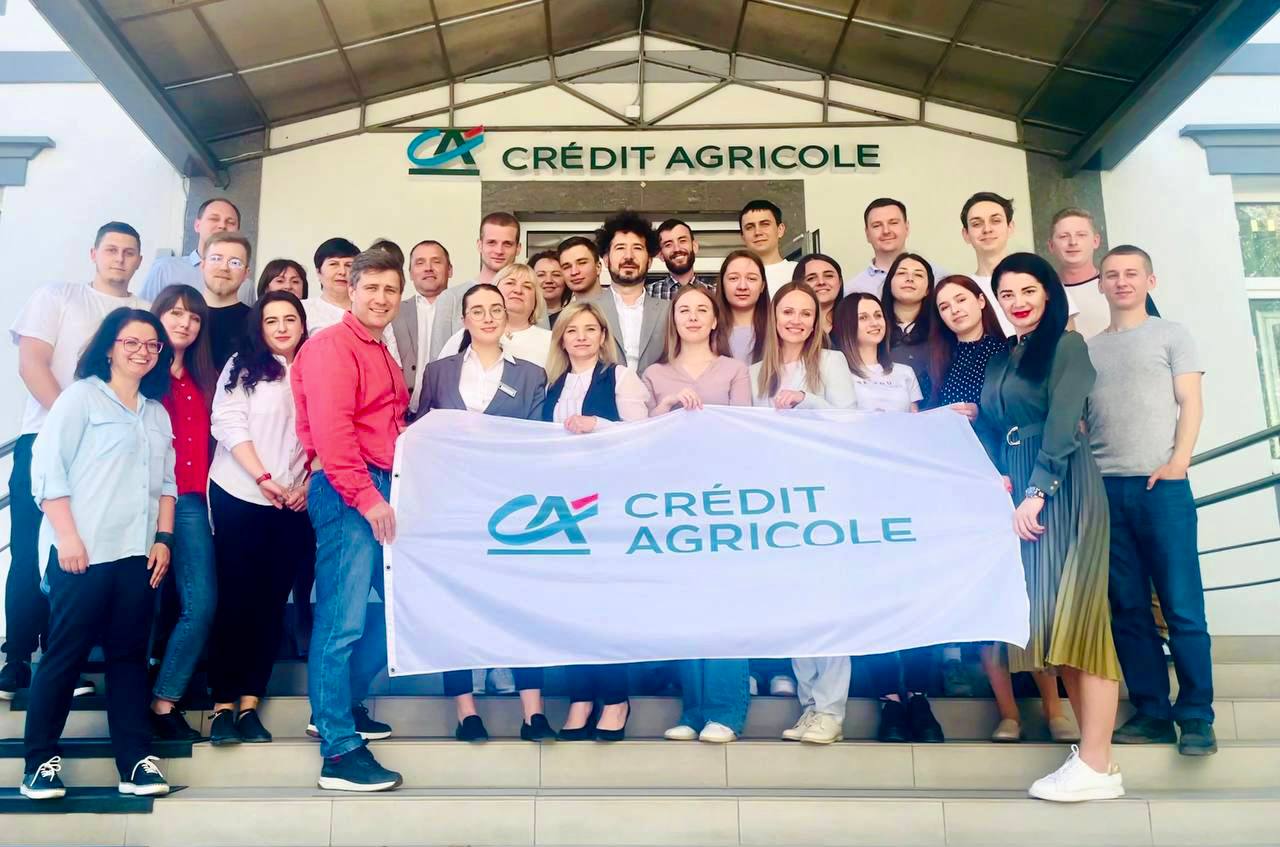
The emotions proved the most challenging, as all people are different: some actually work even in a bomb shelter, some freeze and the person cannot cope, some stay in risky regions, some are internally displaced or leave the country altogether. The hardest thing for me proved to be that there is no one recipe for all, as each has their own fears, circumstances and possibilities. For the bank to operate in a stable manner, we had to find a solution for every employee, and their number exceeds 2000 people. Granted, there are units that can work fully remotely, but also there are those that cannot due to their work specifics. Therefore, the psychological factor really affects both the processes and the team spirit. As the French say, faire tourner la banque – those who turn the processes for the bank to function. We must continuously support people’s mental well-being so that they could work where they are now.
– Was the bank financially prepared to such global challenges as the war? How significant was and is your liquidity reserve?
– Certainly, no one was ready for the war, but speaking in pragmatic terms, in 2014 we have already lived through the break-out of the war in the east of our country. At the time, we also suffered losses and damages, our branches were ceased by the occupiers. So from the technical point of view, we were aware of what could come, but we did not expect it to happen on such a large scale.
Talking about the “safety cushion”, liquidity, stability, profitability, etc., even during peace time, our provisioning policy for all the risks has been really conservative, we have well-designed control processes, we monitor all indicators, including the liquidity one. We are the bank where people keep their money even in wartime because they know it is reliable.
I will also add that during March, April and May our liquidity has grown incredibly. We had not experienced anything like it in a while. Within 3 months, private deposits have soared. In summer, the liquidity was stable, so everything is going well in this respect.
On operations in russia
– To suspend operations of Credit Agricole Bank, which is a part of the international financial group, in russia – how fast and difficult was this decision? What is the general attitude of your colleagues to events in Ukraine?
– I would split this question into patriotic-moral aspect and the pragmatic one, i.e. how and when it is doable.
In terms of its stance, I haven’t the slightest doubt that from the first day of war in Ukraine Credit Agricole Group made a decision that they could not operate in the aggressor state as in the time of peace. I am certain that the majority of international banking groups approved a similar decision. Therefore, beginning from February 24, the bank did not provide any financing to the russian companies, no transactions were carried out there.
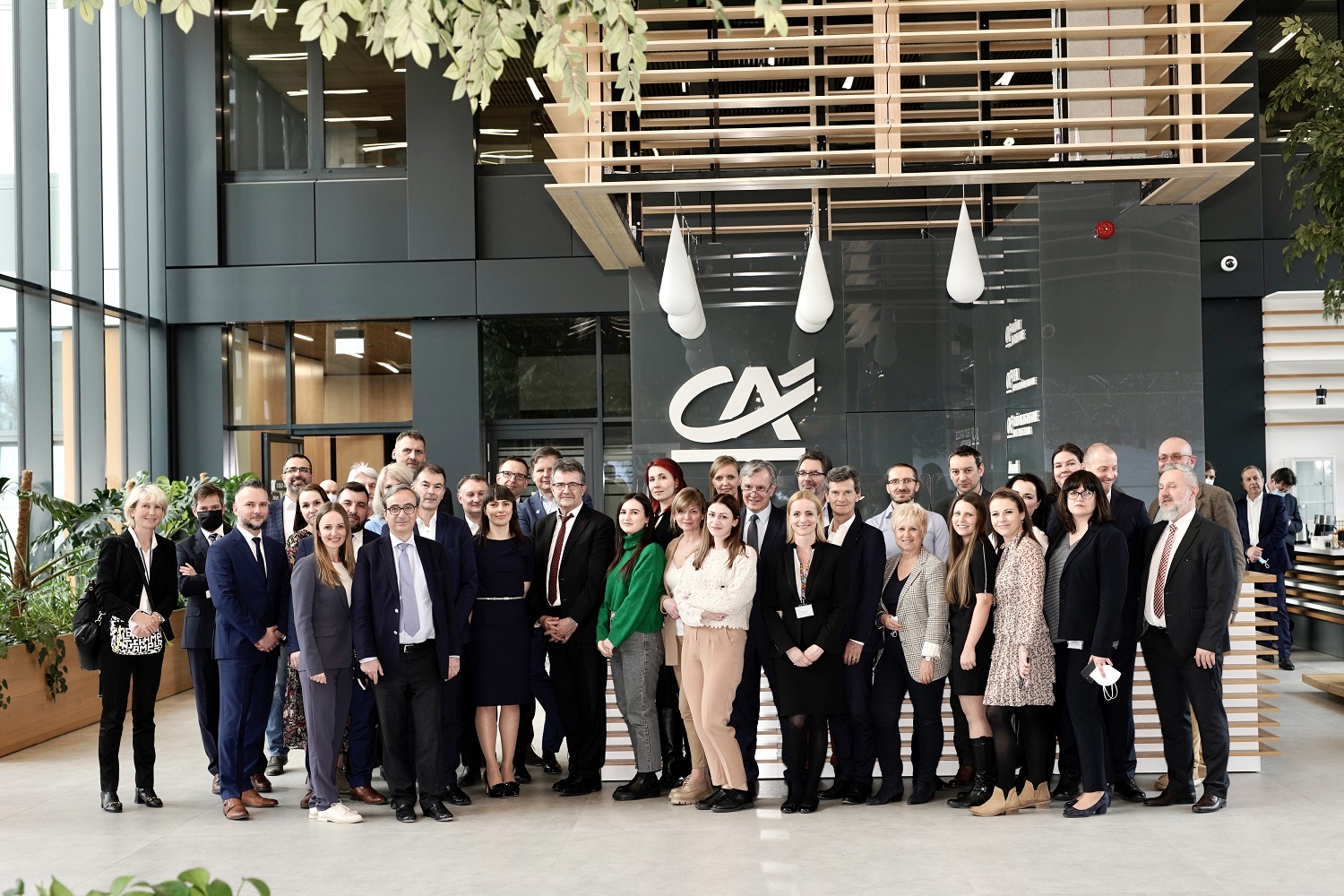
Some may feel that the decision to retreat from the russian market took too long to make. The thing is, however, that the Group was looking into how, when and what the best way is to dismantle the mechanism. As a bank is not a bakery that can be closed no big deal, we can come after the war and open it up again if things change in that country. Bank means money, liabilities, loan portfolio. How can one shut everything down and just leave in a day, effectively gifting the loan money to those companies? It would be worse than being there a little longer while closing everything in the proper way. That is why this process is complex and long-lasting.
On volunteering and support
– Ukrainian banks set out to actively help their customers since the beginning of the war. Some served customers even during active hostilities, then there was volunteering both on the bank level and that of individual employees. What policy in terms of customer support did your bank opt for?
– From the beginning of the war, we adapted the network operation process. At the time we had daily morning calls with our thirteen regional directors, each of them was making an individual decision on whether to continue work and informed us of the risks. There were cases when a branch would open for just 2 hours, in the dangerous locations only a limited number of employees would go to work, for instance, just two people would come to the bank outlet, quickly process customer requests and go home. It was a demonstration that our employees in the field are capable of making the crucial decisions. In the head office, we could not see whether it was safe to open the outlet in a certain location. While people had to make this decision. Certainly, it was somewhat risky at times, however we realized that nobody would be exposed to unnecessary risk, as the lives of employees and customers are paramount.
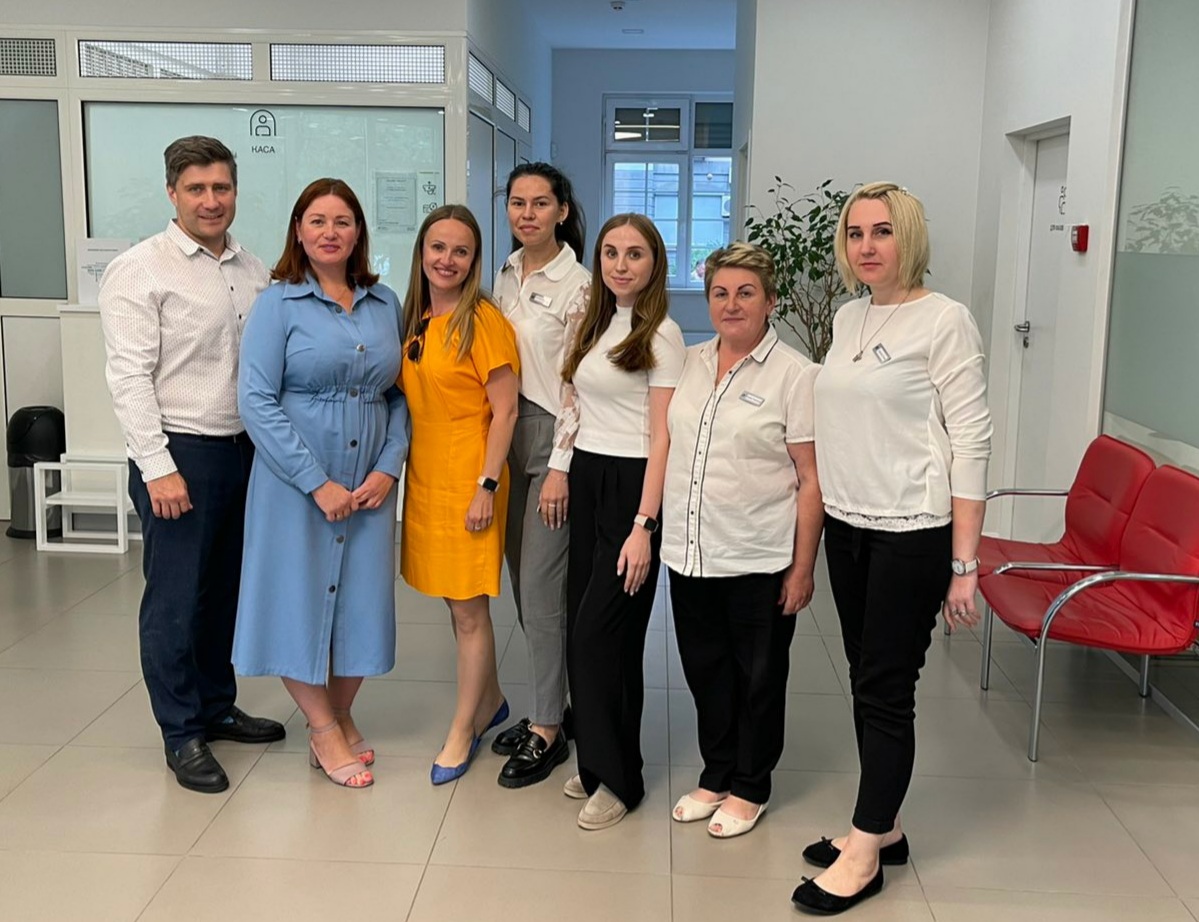
There were cases when we opened our branches even on the occupied territories. Not every day, but from time to time there were requests from customers, as some transactions cannot be performed remotely and so our employees would also go to work there. Then the flow of such transactions dwindled, therefore we stopped doing it so as not to jeopardize the safety of our staff. Since May, approximately, all our branches on the free territory of Ukraine have been open.
By the way, let me share a heartwarming memory: in May, I went to visit a regional branch and we had a talk with customers there. They said: “You know, in your outlet when communicating with your employees we feel like we are home, not at the bank”. I was practically moved to tears! I realized that they all united in solidarity and support each other.
As for volunteering, we also do a lot at both the bank level and that of individual employees. In total, nearly 20 million hryvnias has been channeled into charitable projects. We help certain hospitals, funds, procure medical equipment, medications, purchased a vehicle for humanitarian aid delivery, etc. We know that here and now we were able to help a number of people.
For instance, we transferred 5 million hryvnias to the Red Cross in order to help those affected by the war, another UAH 5.6 million – to the children’s hospital in Zaporizhzhia, as they were in a dire situation. We procured various equipment for medical institutions, the amounts were in the range of 1 to 2 million hryvnias. It may not be much for the entire system, whereas for a specific hospital it is extremely valuable and in the right time.
Many of our employees volunteer, they either initiate various projects or join others. For example, our team members are active blood donors.
Moreover, we had a significant financial initiative – we paid UAH 100 million in taxes in advance. It is a large amount, but we were aware that the war is costly and wanted to help the state to finance the defense of our territories.
In our mobile app, we immediately added the button “Help the Army” and our customers donated over 31 million UAH as of today.
We also finance the real economy, our corporate customers, keep financing them, and do not lower the limits. And it matters for them.
– How did you manage to maintain stability within the team, stable work of the bank? What did you do in order to retain and support your experts? As people and their coordinated effort are at the cornerstone of any successful business.
– First of all, it was essential for the people to know that the bank is staying in Ukraine and is not going anywhere. Credit Agricole Group from the first days of war addressed Ukrainian team stating that they are not going anywhere and are proud of them all and the latter set an example on how to support one’s country and one’s company.
Moreover, our Group set up a fund of 10 million euros, 5 million euros out of which was allocated to help those affected by the war and the rest – for our employees. We announced it to the team at once. We made monetary payments to employees, equal amounts to everybody, regardless of position or salary, simply to offer support during wartime. We also use this money in the situations that the war sadly brought in the families of our employees: lost lives of the loved ones, destroyed property, etc.
In the first three months of the war, we paid salaries in advance, as well as the annual bonus for 2021, even though it was not obvious and not all companies have done it. So we make effort to treat everyone like a family member, we understand that life is hard now and our team members are appreciative of this financial help. Now in our regional branches we also restored the system of bonuses in addition to the base salary that are accrued based on work performance indicators.
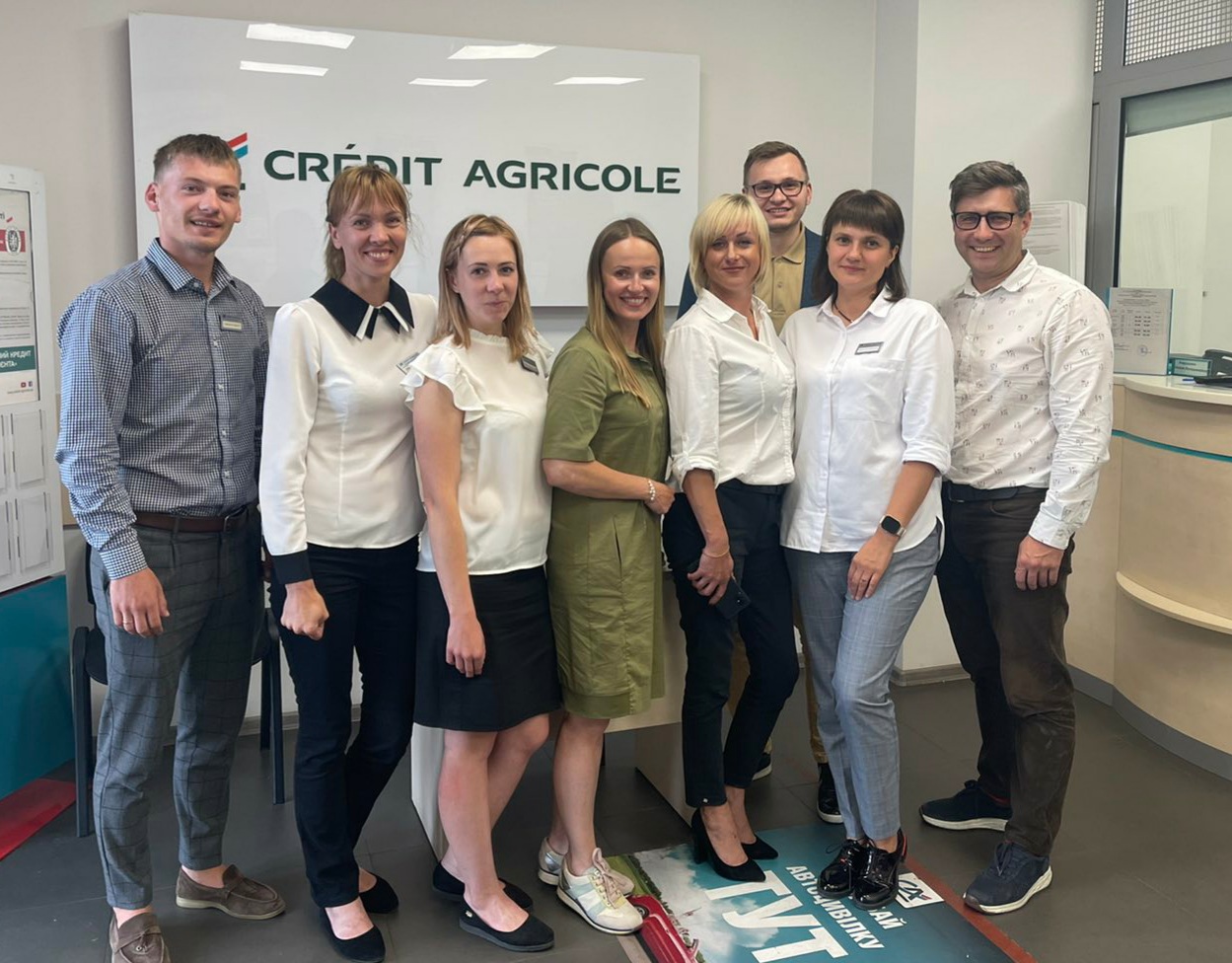
In addition, at the start of the war, when everybody was scared, we arranged several evacuations of employees abroad. The peak number of employees overseas was 15% during March, now it is 8%, i.e. half of them have returned to Ukraine. We also relocated staff internally, found work places for them all in any city.
Unfortunately, not all of our employees were able to leave the occupied territories due to various circumstances. And I know of many companies that had cut off the financial support of such employees. However, we continue this support as we realize that otherwise our people would not even be able to afford food. We keep in touch with them through our regional directors.
On services for businesses and new products
– Speaking of the successful business. Ukrainian entrepreneurs are having a hard time operating in this time. What products and services that simplify and fasten this work does Credit Agricole offer for the business segment?
– Since the beginning of the war, banks ceased financing businesses, however eventually they started gradually making decisions to renew the financial support of their existing customers, same for us. Our bank is closely linked with the agrarian sector. I would even venture to say that we are practically a trendsetter in this area.
In this period, Credit Agricole Bank has issued UAH 1.2 billion under the “Affordable loans 5-7-9%” state program. We also participate in another financing program under the state guarantees. I believe it is great, as these are cash injections in the real sector of economy.
As for support of the small businesses, for a significant period of time we cancelled most fees, offered deferral of payments, etc. This enabled the business to get a break from extensive financial burden and they were able to channel the funds into supporting their employees. By the way, the same applied to our customers-private individuals. We cancelled many fees for them, however, the bank has to make money somehow, pay salaries and pay back loans, so we are gradually reintroducing these fees now.
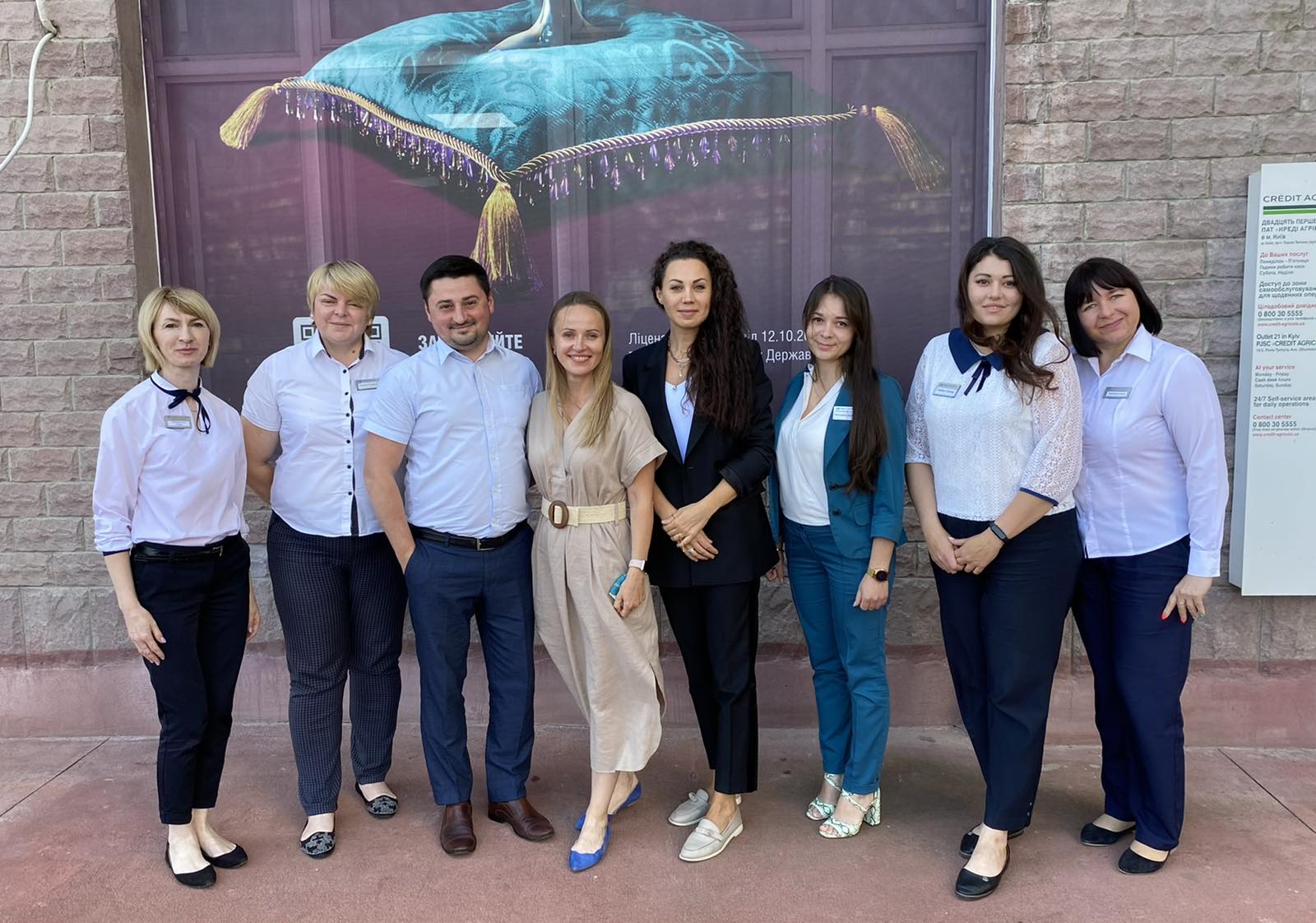
Also, we rank second on the automotive lending market. At the beginning, we issued loans only for the decisions approved prior to the war. However, from July 1 we brought back such product as car loans and have already issued nearly UAH 200 million in loans. In addition, we cooperate with our strategic partners that we worked with before the war. To clarify, this product is currently available for private individuals, however we are having a discussion with our risk management on restoring the programs for legal entities.
We developed numerous restructuring and refinancing programs for those customers that are having a hard time repaying the loans. This applies to private individuals, as well as to legal entities. We are not simply waiting until they come to us, instead we are being proactive and make phone calls, write to them, make offers, put ourselves in the position of every customer, try to help – be it stretch payments, offer credit holidays, etc. To find a solution is a win-win for both the bank and the customer.
– Talking about the full operation of the bank, to what extent was it restored? What products have been resumed completely?
– The bank is in full operation, however, in terms of products, not all of them have been resumed completely, and namely it concerns loans. We have not brought back mortgages and cash loans yet, since we believe that it is still too early for that. However, we did restore credit card limits for the existing customers who repaid them.
In the corporate segment, everything is also working in terms of financing, however we are not taking on board new customers with the exceptions of those who seek financing under the aforementioned state programs.
Full operation of the bank is supported by the fact that we have not suspended any strategic investment project. The Group did not prevent us from keeping up with those investments that have already been started. That is, the bank is not launching any new investment projects, as it is not feasible to take up everything at once, however it is focusing on keeping the already existing ones.
– Does Credit Agricole have any plans for the near future or are you reluctant to make plans beforehand? Do you happen to prepare the launch of any products?
– Yes, we continue to develop our CA+ mobile app, a whole team of IT developers is working on that. In summer, we launched a number of new features there and we are planning to continue doing that before the end of the year.
In October, we are launching a separate application for entrepreneurs CA+ Pro – it is a colossal investment. We also have a large project with changes to the CORPEX client-bank for all corporate customers.
In addition, we are working on the transfer of our banking applications to iCloud. We have a project of a reserve Data center and many others.
Now onto the planning horizon. When previously we would plan our bank strategy for 5 years in advance, now we plan our activities for 2 months. Unfortunately, we have to live in this new reality. I will say the following: we understand what must be done in the next 2 months and where we want to be in the next 10 years, but it is hard to make an accurate forecast of what will happen in the next year. That is, short-term perspective is clear since we decide on it daily at work. Long-term perspective is also clear, as there is no doubt that Ukraine will win and our financial Group will also help rebuild the country, the bank will be here even in 10-15 years. It is hard to forecast, however, what exactly will happen in the next year.
It is important for the customers to know that the bank is operating, all the systems are functioning, the outlets are open, and managers are available at their workplaces. And when the war is over, then there will be the spike in interest towards new technological services and products.

 Useful information
Useful information
 Useful information
Useful information
 Useful information
Useful information
 Useful information
Useful information
 Useful information
Useful information
 Useful information
Useful information
 Useful information
Useful information
 Useful information
Useful information
 Useful information
Useful information
 Useful information
Useful information
 Useful information
Useful information
 Useful information
Useful information
 Useful information
Useful information
 Useful information
Useful information
 Useful information
Useful information












